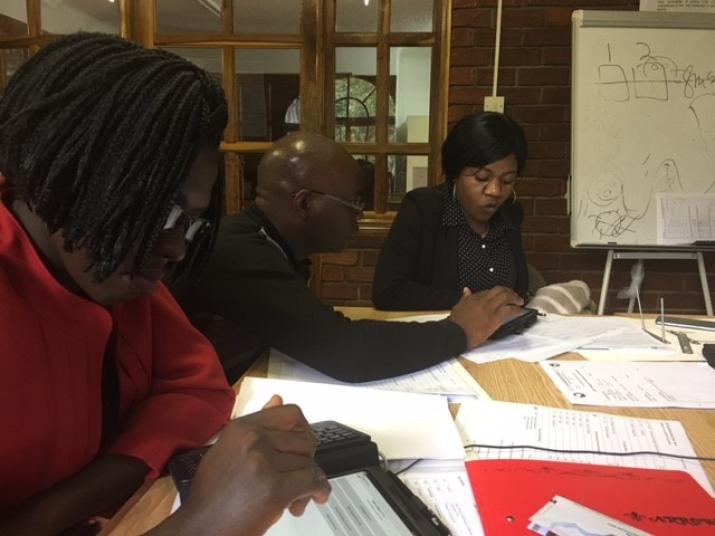
Research assistants practicing data collection during training. Left to right: Nyaradzo Mabido, Wellington Samuriwo and Abigail Pikayi.
Published July 26, 2017, last updated on October 10, 2017 under Voices of DGHI
By Crissi Rainer, 2nd-year MSc-GH student
Before arriving in Harare, Zimbabwe, I never felt fully in control of my fieldwork project; however, I knew that complete control was not an option given that I was 8,000 miles away.
Luckily, there was an amazing team of Zimbabwean researchers working hard to ensure the foundations were laid locally for a smooth start to our project.
I will never be able to thank my research partners, Belinda Chihota and Chido Dziva Chikwari, enough for their tireless work both before my arrival and during my fieldwork. Their on-the-ground knowledge and research expertise have been invaluable, allowing me to learn more about running a research project and research methods than I ever dreamed possible.
Once I arrived in Harare, Zimbabwe, I quickly came to the realization that I would never be fully in control of my research destiny. The research project was quite ambitious. Our goal was to diagnose 150 HIV-positive children aged two to 18 to validate the accuracy of an oral fluid HIV test against the rapid diagnostic test that uses blood from a finger prick.
Even though I knew this goal would be hard to achieve, I did feel bolstered in achieving it after meeting the four amazing research assistants (RAs) hired by the research team before my arrival.
My confidence quickly declined after our first week of data collection. Our team of RAs worked hard to recruit participants, but we hadn’t diagnosed any children as HIV-positive. I knew this meant that we would not reach our proposed sample size.
I was disheartened at that point, because I really believed in our project. Validating the oral fluid HIV test in children would break down barriers that keep children from getting tested for HIV, as it is easy to perform and painless.
After feeling gloomy the first two weeks about the feasibility of diagnosing 150 HIV-positive children, my thoughts turned towards my Teach for America training on locus of control. During our teacher training, it was drilled into us to concentrate on our locus of control, worrying only about what we can control and letting go of what is beyond our influence.
Clearly, I have no control over how many HIV-positive children we are able to diagnose. Instead, I chose to focus on what I can report based on the data.
Based on what we are finding at our study sites, it seems as though pediatric HIV is on the decline in Harare, Zimbabwe. This finding could be related to the successful scale-up of elimination of mother to child transmission (e-MTCT) programs. [1] While this finding may make validating the oral fluid HIV test in children more difficult, I have chosen to look beyond the narrow scope of our study and celebrate the high number of children we have found that are HIV-free.
Even though the number of children born with HIV is declining in Zimbabwe, it has not reached zero, so new solutions to test children and especially older adolescents are still needed. [2] Our research team is working tirelessly to find new solutions through collaborating with other organizations and researchers to continue our study after my fieldwork has ended.
I may not be able to control how many HIV-positive children our RAs can find this summer, but I am committed to do everything in my power to ensure the work our team began is completed.
References
- Zimbabwe Ministry of Health and Child Care and Zimbabwe National AIDS Council. (2015). Zimbabwe National HIV and AIDS Strategic Plan (ZNASP) 2015-2018.
- PEPFAR Zimbabwe. (2016). Country Operational Plan (COP) 2016 Strategic Direction Summary. Available at: https://www.pepfar.gov/documents/organization/257623.pdf. (Accessed 10th July 2017).


